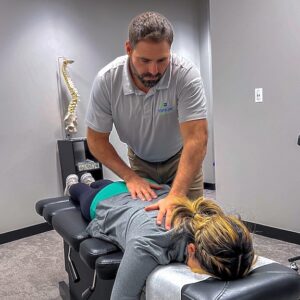Degenerative disc disease (DDD) can be a source of persistent discomfort and limited mobility for many. Amidst various treatment options, chiropractic care emerges as a promising alternative for managing and alleviating the symptoms of DDD. Understanding the role of chiropractors and their specialized services sheds light on this effective approach.
Understanding Chiropractic Services
Targeting Spinal Health
Chiropractors adopt a holistic approach, recognizing the spine’s pivotal role in the body’s overall well-being. The spine serves as the central pillar supporting the nervous system, and any misalignments or irregularities can lead to various health issues beyond mere back pain.
Techniques for Spinal Alignment Central to chiropractic care are spinal adjustments aimed at restoring proper alignment. Through precise and controlled maneuvers, chiropractors correct misalignments (subluxations) along the spine. These adjustments, often using hands-on manipulation or specialized tools, aim to realign the vertebrae, mitigating spinal irregularities and optimizing nerve function.
Alleviating Nerve Irritation
Misalignments in the spine can exert pressure on nerves, causing irritation or compression. Chiropractic adjustments alleviate this pressure, reducing nerve irritation and allowing for improved communication between the brain and the rest of the body. This reduction in nerve interference contributes to enhanced bodily function and overall well-being.
Promotion of Natural Healing Processes
Chiropractors facilitate the body’s innate ability to heal itself. By restoring spinal alignment and reducing nerve interference, chiropractic care promotes the body’s natural healing processes. When the spine is aligned correctly, the body can function optimally, aiding in the recovery and repair of damaged tissues.
Beyond Back Pain: Comprehensive Health Benefits
While back pain relief is a significant outcome of chiropractic care, its benefits extend to various aspects of health. Improved spinal alignment positively impacts not only musculoskeletal issues but also influences nervous system function, immune response, and overall body functionality.
Tailored Treatment Plans
Chiropractic care is highly personalized. Chiropractors assess each individual’s unique condition and needs before developing tailored treatment plans. These plans may incorporate a combination of adjustments, therapeutic exercises, lifestyle modifications, and nutritional guidance to address specific health concerns and promote optimal spinal health.
Collaboration for Holistic Wellness
Chiropractors near me often collaborate with other healthcare professionals to provide comprehensive care. This collaboration may involve physical therapists, nutritionists, or medical doctors to ensure a holistic approach to well-being.
Long-term Spinal Health Maintenance
Beyond addressing immediate concerns, chiropractic care emphasizes the importance of proactive spinal health maintenance. Regular chiropractic visits can aid in detecting minor spinal issues early, preventing their progression into more significant problems and contributing to long-term spinal health.
Degenerative Disc Disease: Causes and Challenges
DDD involves the breakdown of spinal discs over time, leading to pain, reduced flexibility, and possible nerve irritation. The degeneration can cause discomfort that affects daily activities. Chiropractors aim to manage these symptoms and potentially slow down the progression of DDD.
How Chiropractic Care Helps Manage DDD
Chiropractors employ targeted adjustments to address misalignments that contribute to DDD symptoms. By improving spinal alignment and function, chiropractic care can relieve pressure on affected discs and nerves, potentially reducing pain and enhancing mobility.
Benefits of Chiropractic Care for DDD Management
1. Pain Relief and Enhanced Functionality
Chiropractic adjustments are tailored to alleviate the chronic pain associated with DDD. These adjustments aim to realign the spine, reducing pressure on affected discs and nerves. By targeting the root cause of pain, chiropractic care provides relief that goes beyond merely masking symptoms. As pain diminishes, individuals often experience enhanced functionality, allowing for improved participation in daily activities.
2. Improved Mobility and Flexibility
Degenerative Disc Disease can severely limit mobility due to stiffness and discomfort. Chiropractic adjustments help restore proper spinal alignment and mobility. Through manipulation techniques, chiropractors aim to enhance the movement of affected spinal segments. This improved spinal function can significantly increase flexibility, enabling individuals to perform tasks and movements that were previously challenging due to DDD-related limitations.
3. Holistic Approach and Non-Invasive Methods
Chiropractic care takes a holistic approach, considering the overall health of the individual beyond DDD symptoms. Alongside spinal adjustments, chiropractors offer guidance on posture, exercise routines, and lifestyle modifications. These non-invasive techniques complement the treatment by addressing the underlying causes of discomfort and promoting overall wellness.
4. Long-Term Management and Preventative Focus
Beyond immediate relief, chiropractic care emphasizes long-term management of DDD. Regular visits to a chiropractor can help in detecting minor spinal issues before they exacerbate, potentially slowing down the degenerative process. This proactive approach aims at preventing further deterioration and managing symptoms effectively, promoting a sustained improvement in the individual’s quality of life.
5. Customized Care Plans and Patient-Centered Approach
Understanding that DDD affects each person differently, chiropractors provide tailored care plans. These plans are developed based on the patient’s specific condition, symptoms, and goals for managing DDD effectively. This patient-centered approach ensures that the treatment aligns with the individual’s needs, preferences, and comfort levels.
6. Potential to Avoid Surgical Interventions or Heavy Medications
Chiropractic care may offer an alternative to invasive surgeries or extensive medication use for some individuals with DDD. By addressing spinal issues and improving overall spinal health, chiropractic interventions may reduce the necessity for surgical procedures or heavy reliance on medications, potentially offering a more natural approach to managing DDD-related symptoms.
7. Collaboration for Comprehensive Care
Chiropractors frequently collaborate with other healthcare professionals to provide holistic care for DDD. This collaboration might involve physical therapists, pain management specialists, or orthopedic doctors, ensuring a comprehensive treatment plan that addresses various facets of the condition and offers a multidisciplinary approach for optimal patient care.
8. Reduction in Inflammation and Pain Management
Chiropractic adjustments have shown potential in reducing inflammation around affected spinal discs. By realigning the spine and alleviating nerve pressure, these adjustments may help decrease inflammation, providing relief from swelling and discomfort commonly associated with DDD. Reduced inflammation often correlates with a decrease in pain levels, enhancing the overall quality of life for individuals coping with DDD-related discomfort.
9. Strengthening Supporting Muscles and Spinal Stability
Chiropractors frequently integrate specific exercises and rehabilitation techniques aimed at strengthening muscles supporting the spine. Targeting these muscles not only enhances spinal stability but also reduces stress on degenerating discs. Strengthening these supportive muscles can significantly contribute to improved posture, spinal alignment, and overall spinal health for those grappling with DDD.
10. Improvement in Nerve Function and Alleviation of Radiating Symptoms
Correcting spinal misalignments through chiropractic adjustments can positively impact nerve function. Enhanced nerve communication may lead to a reduction in radiating symptoms such as pain, tingling, or numbness that individuals with DDD often experience due to nerve compression. Restoring proper nerve function aids in addressing the root cause of these radiating symptoms.
11. Enhanced Circulation to Support Spinal Healing
Chiropractic care may promote increased blood flow to the affected areas of the spine. Improved circulation supports the body’s natural healing processes by aiding in the delivery of essential nutrients and oxygen to damaged spinal discs. Enhanced circulation can potentially contribute to the repair and regeneration of these discs, mitigating the progression of DDD.
12. Stress Reduction and Improved Sleep Quality
Managing chronic pain and discomfort through chiropractic care can significantly reduce stress levels. Lower stress often leads to improved sleep quality for individuals dealing with DDD. Better sleep not only supports the body’s healing and recovery processes but also positively impacts overall well-being and cognitive function.
13. Improved Range of Motion and Flexibility
Chiropractic adjustments targeting spinal misalignments can significantly enhance joint mobility and spinal flexibility. Increased range of motion allows individuals with DDD to perform daily tasks more comfortably and with less restriction. Enhanced flexibility can contribute to better functionality and a more active lifestyle despite the challenges posed by DDD.
14. Support for Lifestyle Modifications and Ergonomic Advice
Chiropractors often provide guidance on ergonomic adjustments and lifestyle modifications to alleviate DDD symptoms. Advice on proper sitting posture, lifting techniques, and suitable exercises empowers individuals to make beneficial changes in their daily routines. These modifications can play a crucial role in managing DDD more effectively and improving overall spinal health.
15. Psychological Benefits and Enhanced Well-being
Effective pain management through chiropractic care near me can have positive psychological effects. Reduced pain levels and improved functionality can lead to a better overall outlook on life. Increased motivation, a sense of empowerment, and reduced anxiety or depression related to chronic pain can significantly improve the psychological well-being of individuals dealing with the challenges of DDD.
Collaborative Approach for Comprehensive Care
Chiropractors recognize the multifaceted nature of Degenerative Disc Disease and often engage in a collaborative approach to provide comprehensive care. This collaborative effort involves teamwork with various healthcare professionals, including orthopedic specialists, physical therapists, pain management experts, and primary care physicians. Together, these professionals bring diverse expertise to the table, contributing to a well-rounded treatment plan tailored to address the complexities of DDD.
Multidisciplinary Expertise
Orthopedic specialists play a pivotal role in diagnosing and assessing the structural changes occurring in the spine due to DDD. Their expertise allows for a comprehensive evaluation, providing valuable insights into the extent of disc degeneration and the potential impact on spinal stability.
Physical therapists are instrumental in designing exercise regimens and rehabilitation programs. These programs aim to strengthen muscles, improve flexibility, and restore functionality in individuals with DDD. By incorporating targeted exercises and physical therapy sessions, they complement chiropractic care, contributing to enhanced spinal health and mobility.
Pain management specialists contribute their expertise in devising strategies to alleviate chronic pain associated with DDD. They may explore various pain management techniques, such as medication management or minimally invasive procedures, aiming to mitigate discomfort and enhance the overall quality of life for individuals dealing with DDD-related pain.
Primary care physicians play a crucial role in overseeing the overall health of individuals with DDD. They coordinate the collaborative efforts, ensuring that all aspects of the patient’s well-being are addressed. Their oversight and guidance in managing other health conditions in conjunction with DDD are integral to holistic patient care.
A Unified Approach for Holistic Management
This collaborative effort among healthcare professionals fosters a unified approach to DDD management. By pooling together their expertise and insights, they create a comprehensive treatment plan that addresses various facets of the condition. This integrated approach ensures that individuals with DDD receive tailored, multifaceted care, aiming not only to alleviate symptoms but also to improve overall spinal health and well-being.
Personalized Chiropractic Care Near You
This collaborative effort among healthcare professionals fosters a unified approach to DDD management. By pooling together their expertise and insights, they create a comprehensive treatment plan that addresses various facets of the condition. This integrated approach ensures that individuals with DDD receive tailored, multifaceted care, aiming not only to alleviate symptoms but also to improve overall spinal health and well-being.
Personalized Chiropractic Care Near You
At Evolve Chiropractic of Vernon Hills, we prioritize patient well-being. Our clinic provides a warm and inviting environment where clients receive attentive care and personalized attention. From injury rehabilitation to ongoing wellness maintenance, our skilled practitioners are dedicated to helping clients achieve their health goals.
750 Bunker Ct Ste 700, Vernon Hills, IL 60061, United States
224-424-4938
https://myevolvechiropractor.com/locations/chiropractor-in-vernon-hills-il





